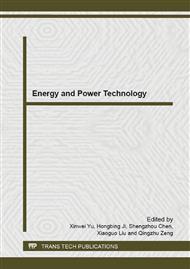p.716
p.721
p.725
p.730
p.735
p.741
p.747
p.751
p.756
Impact Analysis of Excitation System Reactive Current Compensation on the Stability of Sichuan Power Grid
Abstract:
Heffron-Philips model including excitation reactive current compensation (RCC) is set up, impact analysis of RCC on the stability of power system is carried out by theoretical analysis and time domain simulation. Analysis results show that positive RCC increases damping torque while reduces synchronous torque; negative compensation increases synchronizing torque while reduces damping torque, and this phenomenon is more obvious in heavy load. Combined with the actual situation in Sichuan power grid, the role of negative RCC to increase transient stability and provide dynamic reactive power for emergency HVDC power support is analyzed, also negative RCC's influence on the damping characteristics in Sichuan power grid is evaluated.
Info:
Periodical:
Pages:
735-740
Citation:
Online since:
September 2013
Authors:
Price:
Сopyright:
© 2013 Trans Tech Publications Ltd. All Rights Reserved
Share:
Citation:


